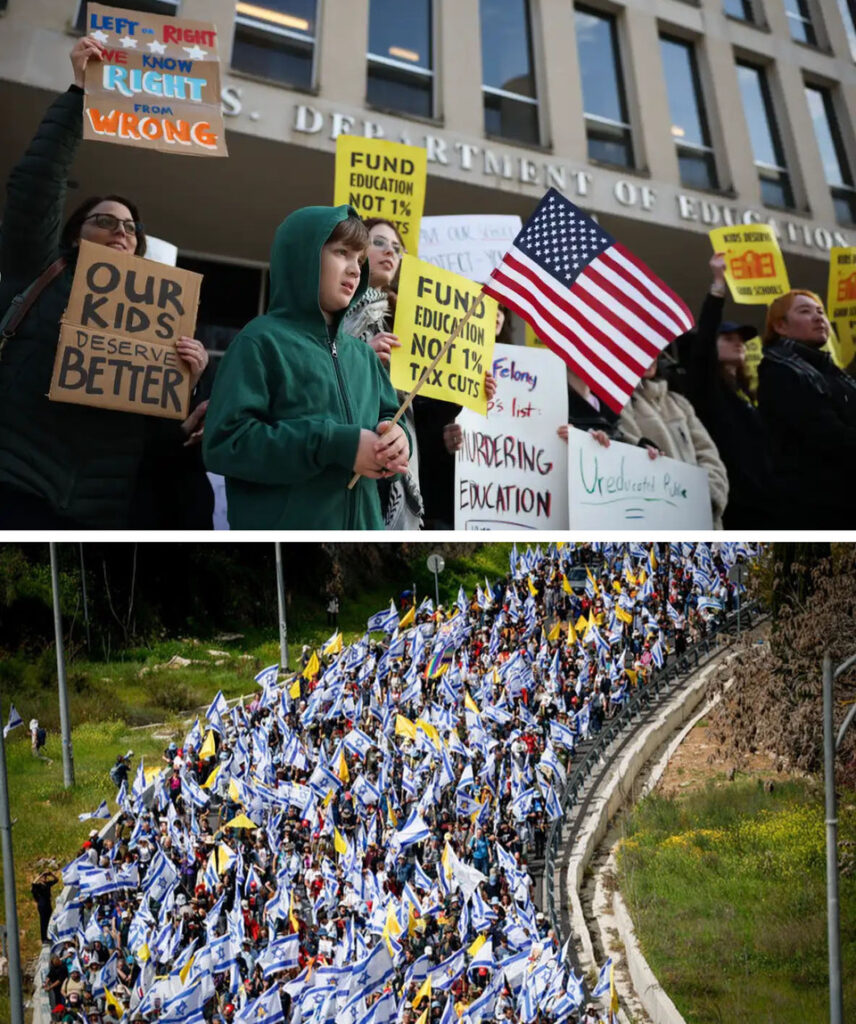Community members hold signs and rally in front of the Department of Education to protest budget cuts on March 13, 2025 in Washington, DC. – Nearly 100 000 Israelis march towards Jerusalem to demonstrate against the government on March 19, 2025
Israel and the United States are currently led by two men united by the same paranoia, a rejection of democratic norms, and a total absence of morality.
In both countries, democratic institutions are being shaken by relentless attacks on the free press and the judiciary, as well as the dismantling of institutional safeguards—threatening to profoundly alter the nature of their regimes. However, in response to these similar assaults, the citizens of each country have reacted in entirely different ways.
While Israeli citizens mobilized first in 2023 and again in recent weeks—intensifying after the dismissal of the Shin Bet chief—Trump’s systematic destruction of institutions in the U.S. has only triggered scattered and relatively weak reactions.
The paradox, which is only apparent, is that the opposition in Israel is much stronger, even though it is the younger country with less tested institutions. Israelis are deeply aware of the fragility not only of their national and physical existence but also of their institutions, given the lack of a written constitution and only two branches of government—whereas in the U.S., Congress (in theory) operates independently of the executive.
A sense of vulnerability is ingrained in the Israeli psyche, stemming both from Jewish history and Israel’s geopolitical reality. Their relatively untested institutions reinforce the understanding that they are the only line of defense and cannot rely on anything or anyone else. This applies not just to their security but also to the democratic nature of their country.
In contrast, this sense of vulnerability is absent in the U.S., where there have been no wars on its soil since the Civil War (9/11 being a terrorist attack, not a war). Americans believe their institutions are robust enough to protect them. There is a near-reverence for the Constitution and the Founding Fathers, whose very title reflects their quasi-divine status as inventors of “checks and balances” supposedly shielding American democracy from any attack—even one led by an autocratic-leaning president.
However, it is unlikely that the Founding Fathers could have foreseen a President Trump in the age of social media and post-truth. American democracy is now facing its true test.
With Congress paralyzed—Republicans submissive and Democrats unwilling to initiate a true power struggle—the only remaining forces opposing Trump are the judiciary and the press. It is no surprise, then, that he attacks them aggressively. While the press continues to play its role, its weakening in favor of social media leaves the judiciary as the last line of defense for American democracy—especially after Trump’s purges within the FBI, the military, and other federal institutions.
Ironically, Trump’s constant talk of the “Deep State” may have led not only his supporters to believe in it but also his opponents, who seem to think that some higher force will save them—even after his purges. Many now rely on institutions and especially judges, whom Trump relentlessly labels as “corrupt.” His attacks have been so extreme that John Roberts, the conservative Chief Justice of the Supreme Court, felt compelled to break his silence and defend them.
Another buffer for Americans is the country’s federal nature, which allows them to live their lives relatively undisturbed by national political upheavals. This illusion of security applies not only to daily life but also to the belief that their state governments—particularly their governors—will shield them from extreme policies coming from Washington.
Israel’s geography and size make such complacency impossible. While there may be a “bubble” in Tel Aviv, a seven-kilometer drive leads to Bnei Brak, an ultra-Orthodox city, and the distance between Jerusalem and Tel Aviv is only 60 kilometers. There is no independent or autonomous authority from the central government in Israel, meaning that national policies have direct and often immediate consequences on all Israelis’ lives.
In other words, Israelis understand that they cannot remain passive when fundamental issues are at stake. This awareness was evident in the massive return of Israelis from around the world after October 7 to take up arms in defense of their country, as well as in the large-scale citizen mobilization to protect democracy.
This is not to question American patriotism but rather to highlight a sense of complacency—one that may be Trump’s greatest ally in his reckless march to fundamentally transform the country, making it unrecognizable both to the world and to Americans themselves. One can only hope that Americans will react in time to prevent the worst—and take inspiration from Israel, a country whose physical and institutional vulnerability has strengthened its security awareness and democratic resilience.
Sebastien Levi






